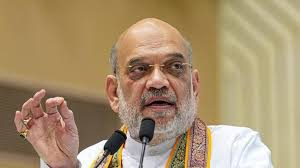Zonal councils have transformed into engines of cooperation: Amit Shah

Union Home Minister Amit Shah recently highlighted a major shift in India’s governance. He said that zonal councils, once seen as mere discussion platforms, have now become active engines of cooperation. His remarks came during the 27th Eastern Zonal Council meeting held in Ranchi, Jharkhand.
What Are Zonal Councils?
Zonal Councils are regional forums formed under the States Reorganisation Act of 1956. India has five such councils: Northern, Southern, Eastern, Western, and Central. These councils promote cooperation between the Centre and the states in each zone. The Union Home Minister chairs all the meetings, and state representatives attend them to discuss shared concerns.
Increased Meetings, Stronger Results
Amit Shah shared clear data to support his claim. Between 2004 and 2014, the councils met only 25 times. However, since 2014, 63 meetings have taken place — a 150% increase.
More importantly, these meetings are result-oriented:
- Around 1,580 issues were raised during this period.
- 83% of them — nearly 1,287 issues — have been resolved.
This shows that the councils are no longer symbolic. They are now effective mechanisms for problem-solving.
Major Issues Taken Up and Resolved
During the Ranchi meeting, representatives focused on several key topics:
- Water-sharing problems involving the Masanjore Dam and Taiyabpur Barrage.
- Coordination of infrastructure projects like the Indrapuri Reservoir.
- Asset and liability division between Bihar and Jharkhand.
- Cross-border crime, drug trafficking, and security cooperation.
These issues often stall development. By resolving them through dialogue, the councils are ensuring faster growth and smoother relations between states.
Security Improvements in Eastern India
Amit Shah also spoke about the decline of Naxalite activity in the region. According to him, areas in Bihar, Jharkhand, Odisha, and West Bengal have seen significant improvements. He aims to eliminate all remaining pockets of insurgency by March 31, 2026.
He also praised joint operations like “Op Sindoor,” where states worked together to neutralize threats. These coordinated efforts show that security can be improved through collaboration.
Criminal Law Reforms and State Responsibilities
Another point of focus was the implementation of three new criminal laws:
- Bharatiya Nyaya Sanhita (replacing IPC)
- Bharatiya Nagarik Suraksha Sanhita (replacing CrPC)
- Bharatiya Sakshya Adhiniyam (replacing the Indian Evidence Act)
Shah urged Eastern states to adopt these laws swiftly. He also recommended regular district-level meetings to curb drug trafficking and strengthen local law enforcement.
From Talk to Action: The Power of Zonal Councils
Traditionally, many saw Zonal Councils as ceremonial bodies. However, the current data shows a shift in both mindset and function.
These forums now:
- Resolve border disputes before they escalate.
- Help in transport and infrastructure planning.
- Coordinate disaster response and resource sharing.
- Facilitate real-time communication on interstate challenges.
Instead of depending solely on Parliament or the courts, states now have a faster, more direct way to handle issues.
Eastern India’s Strategic Role in Growth
The Eastern region plays a vital role in India’s development. It has:
- Rich mineral resources
- A strong agricultural base
- Untapped potential in tourism and industry
For this growth to happen, state collaboration is essential. Shah emphasized that Zonal Councils can bridge development gaps and ensure no region is left behind.
The Road Ahead: Digitization and Vision 2047
Looking forward, the government aims to make Zonal Councils even more effective. Plans include:
- Digitizing council records and tracking decisions online
- Launching a Zonal Coordination Dashboard for real-time updates
- Including new topics like climate change, urban planning, and AI governance
These changes align with India’s Vision 2047, which aims to transform the country into a developed nation by its 100th year of independence.
Conclusion: A Model for Cooperative Federalism
Under Amit Shah’s leadership, Zonal Councils are now doing much more than facilitating discussions. They are actively solving problems, sharing resources, and driving joint progress.
By increasing meeting frequency, resolving a high percentage of issues, and addressing security and legal challenges head-on, these councils are setting a new benchmark for cooperative federalism in India.
This transformation proves that when the Centre and states work together, real progress is possible — not just promises. action, and cooperation replaces confrontation.






